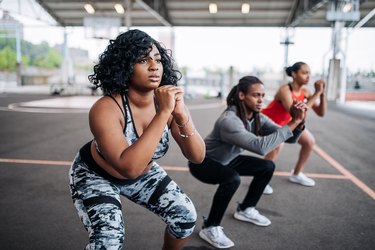
Glucose gets broken down from the carbohydrates in foods and drinks to provide all your muscles and organs with fast-acting fuel. When you work out, your body uses glucose for muscle function, and after you work out, it also requires glucose to rebuild your muscles with protein. The higher the intensity of your exercise, the more glucose you need for fuel.
Advantages of Glucose
Video of the Day
Since using glucose as fuel requires less oxygen than using fat for fuel, at higher intensities — when you have less oxygen available — your body needs to rely on glucose. Therefore, longer and more intense workouts may require you to restore your glucose levels while exercising. Choose simple sugars, which are high in glucose but don't fill you up, like sports drinks, white bread or bagels and honey or jelly.
Video of the Day
Role in Muscle Recovery
According to a study published in the "Journal of the International Society of Sports Nutrition," after working your muscles, not only is protein required to rebuild muscles, but also glucose from carbohydrates. Glucose is what provides the muscles energy to repair themselves using protein. That means it's important to eat carbs as well as protein after your workout the reap the glucose benefits. In fact, the study found that the sooner you get glucose into your bloodstream after a workout, the sooner your muscles start repairing themselves to become stronger.
What to Eat
Glucose occurs naturally in certain whole foods, including fruit, dairy products and vegetables. These foods tend to contain fiber, which makes them filling. You may feel comfortable eating a banana or other type of fruit right before or during a workout. However, if you need something even lighter, you can get glucose sports drinks, chews and gels, which were designed to give you fast-acting glucose during workouts. Sports gels are much lighter and easier to digest than solid foods, yet they pack a lot of calories for their punch. For example, a 12-ounce bottle of a Gatorade sports drink provides 21 grams of carbohydrates, which convert to glucose once digested, and six Gatorade energy chews give you 24 grams of carbohydrates and 100 calories.
How Much Glucose Do You Need?
Try to eat one or two meals before your workout; each meal should include 20 to 30 grams of carbohydrates if you're a woman or 30 to 45 grams if you're a man. Your earliest meals of the day should contain complex carbohydrates and protein for slow-releasing, long-lasting energy. About 30 minutes to an hour before your workout, eat simpler carbohydrates that are less bulky but glucose-dense. Consider adding glucose powder to your water for the gym. It's also important to get enough calories. Unless you're overweight, you want to balance your caloric intake with your energy expenditure — take in as many calories as you burn each day, which maintains your weight. If you're trying to gain weight in muscle, take in more calories than you burn.
- MedlinePlus: Carbohydrates
- Journal of the International Society of Sports Nutrition: Protein Timing and Its Effects on Muscular Hypertrophy and Strength in Individuals Engaged in Weight Training
- Competitor.com: Everything You Need to Know About Energy Gels
- Gatorade: Thirst Quencher
- Gatorade: Prime Energy Chews
- Muscle and Fitness: Pre- and Post-Workout Nutrition Simplified